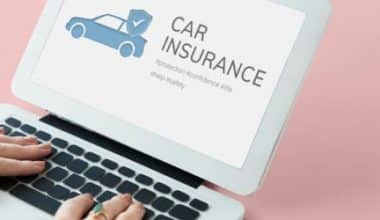If your company owns a car, you will very likely need commercial auto insurance. This is because it covers legal bills, medical expenses, and property damage if a business vehicle is involved in an accident.
Commercial auto insurance covers vehicles used for business purposes, whether or not they’re owned by your company. The coverage is a must for small-business owners who drive to work sites or to meet clients, deliver goods, and haul tools or supplies. Companies with employees who drive their vehicles also need it.
Commercial car insurance is separate from rideshare insurance and personal auto insurance, though you can often bundle these to save money. You may also be able to package this coverage with other types of business insurance, including general liability and commercial property insurance.
What is commercial auto insurance?
Commercial auto insurance is a type of car insurance specifically designed for vehicles used for business purposes. It is a contract between you and your insurance company that outlines how your insurance company compensates you for financial losses if a business vehicle is involved in an accident or other problem covered by your policy.
Business vehicles can include company cars and commercial trucks and vans. Box trucks and food trucks are other examples of vehicles that can be covered by commercial auto insurance. Your personal car insurance won’t pay a claim if you’re driving a car for business and get into an accident.
A commercial auto insurance policy typically includes:
- Liability coverage, including bodily injury and property damage liability, to pay for injuries, deaths or property damage if a driver causes an accident while working. This coverage may also pay legal fees.
- Medical payments, no-fault or personal injury protection, to pay for the medical expenses of the driver and any passengers in an accident, regardless of fault.
- Uninsured motorist coverage to pay for injuries and sometimes property damage caused by an uninsured or hit-and-run driver. This coverage may also include underinsured motorist coverage if the at-fault driver doesn’t have enough car insurance coverage to cover all expenses.
- Comprehensive and collision coverage to pay for vehicle damage from theft, vandalism, flood, fire and damage if a work vehicle is hit by an object or another car.
Commercial policies could include other coverage, like towing and labor, rental reimbursement and lease gap coverage. However, they generally don’t cover tools or other items you’re carrying in the vehicle. A business owner’s policy — which contains commercial property insurance protections — can cover tools owned by the company, while a home or renters insurance policy covers personal belongings in the vehicle.
How does commercial auto insurance work?
A commercial auto insurance policy works like a personal car insurance policy, except it covers your work vehicles such as delivery vans, trucks and company cars. It pays for injuries and property damage to others if you or an employee cause an accident while driving your work vehicle.
Commercial auto insurance also pays to repair or replace your work vehicle if you buy additional coverage types such as collision and comprehensive insurance.
What does commercial auto insurance cover?
- Property damage liability coverage: Provides you with protection if your vehicle accidentally damages another person’s property and in most cases provides you with a legal defense.
- Bodily injury liability coverage: Pays for bodily injury or death resulting from an accident for which you are at fault and in most cases provides you with a legal defense.
- Collision coverage: Pays for damage to your vehicle when it hits or is hit by another object.
- Comprehensive physical damage coverage: Pays for damage to your vehicle from theft, vandalism, flood, fire, and other covered perils.
- Medical payments, no-fault or personal injury coverage: Usually pays for the medical expenses of the driver and passengers in your vehicle incurred as a result of a covered accident regardless of fault.
- Combined single limit (CSL): Liability policies typically offer separate limits that apply to bodily injury claims for property damage. A combined single limits policy has the same dollar amount of coverage per covered occurrence whether bodily injury or property damage, one person or several.
- Uninsured motorist coverage: Pays for your injuries and, in some circumstances, certain property damage caused by an uninsured or a hit-and-run driver. In some cases, underinsured motorist coverage is also included. This is for cases in which the at-fault driver has insufficient insurance.
Top commercial auto insurance providers
Many of the household names in consumer auto insurance also offer commercial policies. Below are some high-rated consumer car insurance companies that also offer commercial policies:
The Hartford
The Hartford’s commercial property policies are divided into two categories: small businesses with less than $200 million in total insurable value and large businesses that go over this threshold. While the essential coverage for both remains the same, each policy is tailored toward the specific needs that change based on company size.
Aside from general liability, commercial property insurance is the most universally carried business coverage you’ll find since it safeguards everything from tools and equipment to office furniture from theft and damage. The Hartford offers commercial auto insurance policies that apply to any business, from entrepreneurs who work from home to large corporations with hundreds of millions of dollars in property to insure.
Commercial property quotes from The Hartford are generally available online. However, you may need to work with an agent to get a quote if you have a large company or need specialized coverage.
Next Insurance
Next Insurance offers commercial auto insurance that can be customized to your specific business needs. Its property insurance can cover business goods and gear, inventory, buildings, equipment breakdowns, and business income interruptions. You decide what you want and need, and its quoting system lets you customize the policy to fit your specific business needs.
However, the provider lacks a 24/7 call center.
Progressive
With policies written for over a million commercial vehicles as of 2022, Progressive is easily the biggest commercial auto insurer and one of the best commercial insurance companies in the United States. While competitors impose limitations on certain vehicle types and industries, this carrier covers a wider variety than anyone else.
It offers policies for trucks, buses, trailers, and even personal vehicles that are partially used for business purposes.
Commercial auto policies from Progressive also offer unmatched convenience, including 24/7 customer phone service and coverage. You can also save money on your business insurance policy when you bundle commercial auto with another type of coverage, such as general liability or a BOP.
State Farm
State Farm has consistently ranked within the top three insurers for customer satisfaction over the last three years. It even has a higher NAIC complaint index than Chubb, and was awarded 856 out of 1,000 points for customer satisfaction in J.D. Power’s Small Commercial Insurance Study.
State Farm offers commercial auto insurance designed for independent contractors, restaurants, professional services, and retailers, with paperless billing and autopay options. Commercial insurance products include BOP bundles, surety and fidelity bonds, and farm and ranch insurance.
Allstate
Allstate’s business insurance offerings are fairly standard, but it doesn’t offer as many options as some of the other insurers. These include workers’ compensation, medical malpractice, directors and officers (D&O) liability, and farm and ranch insurance.
While Allstate doesn’t provide its own workers’ comp policy, an agent may be able to help you obtain coverage through a different carrier.
The insurer’s business owner’s policy (BOP) may be the only way for companies to get commercial auto insurance coverage. It combines general liability, commercial property, business interruption with extra expense, and equipment breakdown coverage. Allstate also offers various endorsements that can extend a business’s scope of coverage.
Cost of commercial auto insurance
Commercial auto insurance costs an average of $147 per month, according to Insureon. But Insureon estimates that more than two-thirds (37%) of its small business customers pay less than $100 a month for commercial auto insurance.
Your commercial auto insurance costs will depend on factors such as:
- Business size
- Business and driving risks
- Number of employees driving insured vehicles
- Number of vehicles
- Types of vehicles
- Value of vehicles
- Claims history
- Employee driving records
- Policy deductible
- Policy coverage limits
How to get commercial auto insurance quotes
Follow these steps to get commercial auto insurance.
- Decide which vehicles and drivers you need to insure: You will probably need Department of Transportation or vehicle identification numbers for each vehicle and driver’s license information for each driver to get quotes.
- Determine how much coverage you need: Insurers typically recommend carrying $1 million in liability protection, according to the Insurance Information Institute. How much collision and comprehensive coverage you need may depend on the size of your fleet, the age of your vehicles and other factors.
- Get multiple quotes: Comparing business insurance quotes can help you ensure you’re getting the coverage you need for the best price. You can get quotes online in minutes from Progressive, Allstate and The Hartford or from online business insurance companies.
- Buy a policy: Some providers will connect you with an agent to complete your purchase. In other cases, you may be able to buy your policy online on your own.
When and why do I need commercial auto insurance?
Certain business usage and vehicle types may be excluded from personal auto insurance policies. Why? Since personal auto policies were not meant for businesses, they are written and rated differently. More important to you—a business owner or manager—businesses often need the particular coverages found in a commercial auto insurance policy.
Determining whether your situation requires commercial auto coverage can still be confusing. Here are instances where you need a business auto insurance policy:
- The car is solely used for work and is a company car.
- The truck or van is owned by the company.
- You conduct a business service with your vehicle.
- You haul tools or equipment in a business vehicle.
- You need high liability insurance limits.
- You transport goods or people in your car, van or truck for work.
- Your employees drive a business vehicle.
What kind of vehicles are covered by commercial auto insurance?
Business vehicles covered by commercial auto insurance include:
- Box trucks
- Company cars
- Commercial trucks and van
- Food trucks
- For-hire livery
- Tow trucks
Commercial auto insurance vs personal auto insurance
Commercial auto insurance provides coverage for vehicles used for business purposes. It includes liability coverage for third-party injuries or property damage, as well as coverage for damage to the insured vehicle.
Commercial auto insurance is similar to personal automobile insurance; it protects your cars, trucks or vans in the event of damage, injury or liability claims. However, commercial auto insurance provides additional coverage, including property and liability trailer exposure, loading and unloading exposure, hired vehicle coverage, non-owned vehicle coverage, and higher coverage limits.
This type of insurance is essential for businesses that own or use vehicles as part of their operations. It protects them from potential liability claims and financial losses resulting from accidents or damage to vehicles.
Personal auto insurance, on the other hand, is for vehicles used for personal purposes.
Your personal auto policy only covers personal driving, whether you’re commuting to work, running errands or taking a trip. It will not provide coverage if you use your car for commercial purposes — if you deliver pizzas, for instance.
Personal auto insurance will also not provide coverage if you use your car to provide transportation to others through a ride-sharing service such as Uber or Lyft. Some auto insurers, however, are now offering supplemental insurance products (at additional cost) that extend coverage for vehicle owners providing ride-sharing services.
If you are self-employed and drive your personal vehicle for business purposes, you may be covered under your personal automobile insurance. If you own your car, truck or van and only use it occasionally for work, you may be able to skate by with standard personal auto insurance designated for business use.
However, if you operate a company-owned vehicle, your vehicle is specifically designated for work, or you need higher coverage, you may need a commercial automobile insurance policy.
Why do you need commercial auto insurance?
Not having commercial auto insurance puts you at risk of having to pay for damage and injuries involving your company vehicles.
Without the coverage, you may wind up paying medical bills and legal fees if you or an employee are injured in an accident involving a business vehicle. You will also have to pay for damages, injuries and potential lawsuits for people in other vehicles and property owners.
Commercial vehicle insurance additionally offers collision and comprehensive coverage, which helps pay to repair or replace your work vehicle for problems such as car accidents, theft, vandalism, floods, fires, severe weather and collisions with animals.
Recommended Articles
- Best Commercial Auto Insurance Providers 2023
- CAR INSURANCE WITHOUT A CAR: How Does It Work?
- Business Liability Insurance: Meaning, Types & Coverage






